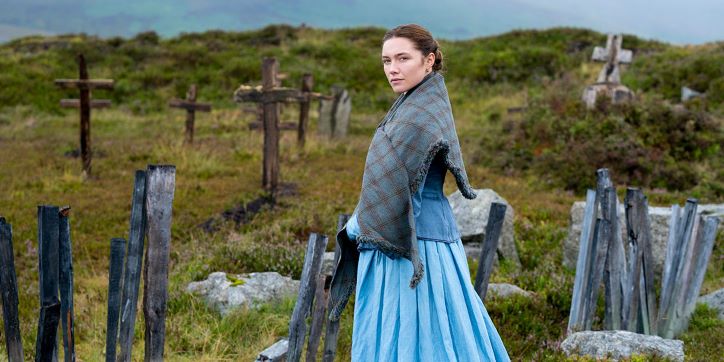![]() Based on Emma Donoghue’s 2016 novel, director Sebastián Lelio’s adaptation undertakes a singular, well-focused fact-finding mission, along with the pragmatic Lib Wright, played with assurance and righteousness by Florence Pugh, in a performance that recalls her steeliness from Lady Macbeth. (Donoghue co-wrote the script, which emphasizes action over dialogue, with Lelio and Alice Birch, also of Lady Macbeth.) Without grandstanding or histrionics, Lib stands her ground as an English nurse hired by an Irish provincial village for her assessment: How has the adolescent Anna O’Donnell (the remarkable Kíla Lord Cassidy) survived four months only on water without eating any kind of substance? The fasting girl claims her stamina comes from “manna from heaven.” The rural Catholic community considers the feat a miracle, as does Anna’s family and the local priest (Ciarán Hinds).
Based on Emma Donoghue’s 2016 novel, director Sebastián Lelio’s adaptation undertakes a singular, well-focused fact-finding mission, along with the pragmatic Lib Wright, played with assurance and righteousness by Florence Pugh, in a performance that recalls her steeliness from Lady Macbeth. (Donoghue co-wrote the script, which emphasizes action over dialogue, with Lelio and Alice Birch, also of Lady Macbeth.) Without grandstanding or histrionics, Lib stands her ground as an English nurse hired by an Irish provincial village for her assessment: How has the adolescent Anna O’Donnell (the remarkable Kíla Lord Cassidy) survived four months only on water without eating any kind of substance? The fasting girl claims her stamina comes from “manna from heaven.” The rural Catholic community considers the feat a miracle, as does Anna’s family and the local priest (Ciarán Hinds).
Set in post-famine 1862, the story line faithfully follows Lib’s quest, beautifully filmed on location in the Midlands by cinematographer Ari Wegner (The Power of the Dog), with seemingly natural light in dark interiors straight out of Vincent van Gogh’s The Potato Eaters. Outdoors, the vibrantly green hillside is upstaged by Lib’s vibrantly blue dress worn as she daily treads from her lodgings to the O’Donnell’s, with mud trimming her skirt.
Lib observes the young girl, exchanging shifts, without any sort of collaboration whatsoever, with Sister Michael (Josie Walker). The pace is something of a procedural while it follows Lib step-by-step feeling her way around the village and its ruling board of crotchety men. She’s told at least once that she doesn’t understand the community, meaning their Catholic faith. A widow who was married for less than a year, Lib has served in the Crimean War and has seen death first-hand, all of which points to a secret she keeps in her boarding room (apart from this revelation, the film’s editing refrains from telegraphing information).
Another outsider, an Irish-born journalist, William Byrne (Tom Burke) from London, hovers in the background, seeking any morsel of information—the phenomenon of Anna’s feat sells newspapers, and the girl has become a celebrity. However, after weeks of observation, the nine-year-old remains wholeheartedly alive though no one has witnessed her eating. To fulfill her quest, Elisabeth banishes all of Anna’s interactions with her family and maintains a solitary watch over the girl. In due time, Anna begins fading rapidly, her death imminent.
The director acknowledges from the very beginning that the viewers are entering the world of fiction, with an actor announcing, “This is the beginning of a film called ‘The Wonder’” and a pan across a sound stage that lands on the set where the drama begins. This self-conscious device, the acknowledgement that the director and his team are here to seduce you through storytelling, wouldn’t work if the actual story wasn’t as enthralling. Propelling this story forward are the animal-like sounds that make up the creepy, melancholic, otherworldly score by Matthew Herbert. Hand in hand with the editing, the music adds tension and an extra exuberance.
The Wonder shares similar themes—patriarchy, faith, and abuse—with the highly-touted Women Talking, which also screened at the festival. Whereas that sepia-toned debate-driven drama announces itself as A Serious Film and never lets you forget it, the team behind The Wonder spins a sinuous narrative of many colors. It’s easily one of the classiest films that Netflix has distributed.
The Wonder will be released on November 16 and stream later in December.

















Leave A Comment